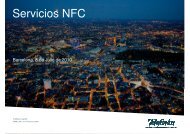Adaptability of cashpoints for the disabled
Adaptability of cashpoints for the disabled
Adaptability of cashpoints for the disabled
- No tags were found...
Create successful ePaper yourself
Turn your PDF publications into a flip-book with our unique Google optimized e-Paper software.
4.2.3 The United KingdomIn 1995 <strong>the</strong> Disability Discrimination Act was introduced (DDA), whichprotects <strong>the</strong> legal rights <strong>of</strong> <strong>the</strong> <strong>disabled</strong>. These cover occupation, access toservices, education, transport and housing. 5Part III <strong>of</strong> <strong>the</strong> act is based on <strong>the</strong> principle that <strong>disabled</strong> people must not bediscriminated against by those providing public services.In <strong>the</strong> specific area <strong>of</strong> banks <strong>the</strong> following aspects are taken into account:- Banks provide <strong>the</strong> service <strong>of</strong> withdrawing money at <strong>the</strong> counter during<strong>of</strong>fice hours and from automatic cashpoint 24 hours a day. While thisservice is in operation when <strong>the</strong> counter service is closed, <strong>the</strong> bank mustprovide an additional service subject to that stipulated in <strong>the</strong> DDA.- Banks provide a cashpoint machine in a commercial area or ano<strong>the</strong>r kind<strong>of</strong> public place (supermarket, airport, trade fair, etc...). The bank isresponsible <strong>for</strong> ensuring <strong>the</strong> service is not discriminatory, while <strong>the</strong>organisation responsible <strong>for</strong> <strong>the</strong> site where <strong>the</strong> cashpoint machine isplaced must ensure that a <strong>disabled</strong> person has physical access to it (free<strong>of</strong> obstacles, etc.).In <strong>the</strong> UnitedKingdom <strong>the</strong>re is<strong>the</strong> DisabilityRightsCommission, anindependent bodyfounded in 2000by Parliament tostopdiscrimination andencourage equalopportunities <strong>for</strong><strong>the</strong> <strong>disabled</strong>.According to Section 21 <strong>of</strong> <strong>the</strong> Act, providers <strong>of</strong> services have <strong>the</strong> legalobligation to make reasonable adjustments so that physical barriers can besurpassed, but <strong>the</strong>re is no regulation that standardises accessibility, <strong>the</strong>definition <strong>of</strong> “reasonable” not being determined by <strong>the</strong> law.The Disability Rights Commission is an independent body founded in 2000 byParliament in order to stop discrimination and encourage equal opportunities<strong>for</strong> <strong>disabled</strong> people. The Commission provides advice to <strong>the</strong>se people, <strong>of</strong>fers<strong>the</strong>m legal aid to defend <strong>the</strong>ir rights, and organises activities in order tochange policies, practices and awareness, among o<strong>the</strong>r aspects.In terms <strong>of</strong> standards <strong>the</strong>re is <strong>the</strong> British Standard BS 8300:2001 “Design <strong>of</strong>Buildings and <strong>the</strong>ir approach to meet <strong>the</strong> needs <strong>of</strong> <strong>disabled</strong> people” whichcovers <strong>the</strong> more physical aspect <strong>of</strong> accessibility. The Centre <strong>for</strong> AccessibleEnvironments has produced a report with recommendations and proposals, in<strong>the</strong> <strong>for</strong>m <strong>of</strong> a standard, to adapt automatic cashpoint machines.5 More in<strong>for</strong>mation at 16 ADAPTABILITY OF CASHPOINTS FOR THE DISABLED









